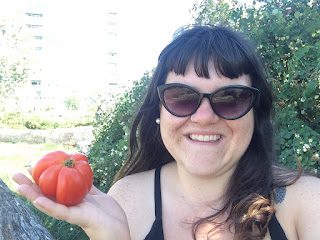 |
| Market Twinsies! |
One of my jobs, the one I could even say I love the most, is my position as the Market Manager at the
University Farmers Market. When I was looking at schools for my undergraduate degree, one of the pulls to the University of Northern British Columbia was access to a farmers market on campus that I had a goal to be involved with in one way or another. In my first year I volunteered every week setting up tables and helping vendors load their goods and became the volunteer coordinator. In year two I was voted in as the chair of the committee and helped with everything from events to wearing a carrot suit when needed. Now in my 3rd and final year I have taken over as the manager and am putting my experience and passion to use every week.
Though the UFM runs Tuesdays from 11-3pm during the school year there are still lots of things happening before market day from organizing special events, to coordinating layouts and finding new vendors. The main event for me is market day. Here is a look at a day in the life of a market manager on a typical market day:
 |
| Harvesting in the PGPIRG Garden |
7:00- The mad dash begins as I catch the first bus up to the University to begin my day. My first order of business is to get to Campus in time for a quick shot of coffee from
Degrees Coffee Co to get me through the busy day ahead.
8:00- As I was also the gardener for the summer, harvest time is still in progress. I arrive at the
PGPIRG Garden as early as possible to pick and wash the weeks ripe vegetables to bring to sell at the UFM.
9:00- Set up begins in the NUSC event space that houses our weekly market. I arrive before volunteers and prepare the space for vendors to arrive. Set up may seem similar every week but behind the scenes a complicated game of Tetris is happening with vendors preferred spaces, last minute cancellations and purposeful placement of each type of goods fighting it out with weekly special events for the ideal space.
 |
| The Market Before Vendors Arrive |
10:00- As volunteers arrives to help we meet vendors at the loading docks and load their goods onto carts. Volunteers then head to the market and I assign them their table for the day.
As I learnt from our first market we need to carefully map out who is using which outlet to make sure we don't lose power, which happens more often then you'd think.
11:00- The Market opens to the public! As eager customers begin to trickle in last minute set up is still going on. There are always a few late arriver's that need a bit of help getting going and I rush around the room to ensure vendors have every thing they need to get through their day, be it small change, an extra chair or even a coffee.
 |
| Market Time |
12:00- The rush hour is on and we see a few hundred people through the market during the busy lunch hour. I make sure there is enough change for jams and kale and answer questions to people coming through. As it is my third year at the market there are a lot of familiar faces and I always try to say hello to everyone.
13:00- As the peak traffic time ends a slower paced market atmosphere emerges and more people lounge in the chairs and chat with vendors. I take this opportunity to visit each vendor to collect weekly table fees and do my personal shopping at the same time.
14:00- If it is quiet enough and everything seems to be running smoothly I indulge in a 10 minute back rub from Kathy at Relax-in-chair. A guilty pleasure, which I have never regretted.
15:00- The second the clock strikes three the mad dash for carts to leave begins. Unlike the morning as vendors trickle in over an hour the exit is much more instantaneous. Volunteers struggle to get carts fast enough to meet vendor itching to get back to the farm or pick up their kids.
 |
| Crunchette the UFM Mascot |
Oh no! We find a cooler with sausages left behind by a vendor and call them straight away to let them know we have them and arranging pick up for the next morning. Sometimes if we are lucky someone leaves a sweet treat for volunteers to thank them for their much needed hard work that day. Other times I buy cookies to show them how much we love having them around!
16:00- Accounting is finished and we deposit revenues for the day at finance before they close at 16:30. Clean up finishes and we make it so it looks like the market had never happened.
17:00- At the end of a busy day I am always thankful the
Thirsty Moose Pub is our neighbour (and another job of mine). Once everything is tidied and the last of the tables are taken down I grab a chair at the bar and sip a local brew to finish out the day.
As you can see it is a busy day full of challenges and there is never a dull moment. It is a happy place to work, a place full of good food, homemade crafts and lovely people. I wouldn't trade it for the world.
See you on Tuesday,
Melanie
"What makes the farmers market such a special place is that you're actually creating community around food." -Bryant Terry












































